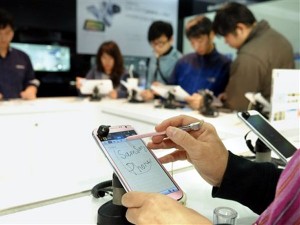SEOUL, South Korea—No red carpet. No sleek limousines dropping off celebrities dressed to impress.
It is the world’s “least authoritative” film festival, according to one of its organizers, featuring works by unlikely filmmakers with little to no capital or experience and only smartphones as their camera equipment.
In its third year, South Korea’s annual Olleh International Smartphone Film Festival has drawn more than 700 entries from South Korea and abroad, up from about 400 submissions last year. Twenty five were selected for screening during the festival which ends Saturday.
“When I was in college I wanted a camera so much, so I sold doughnuts for six months to buy a Hitachi camera,” said Bong Joong-ho, 44-year-old South Korean movie director who is jury president for the festival. “But now more than 30 million people have more than 30 million cameras they can shoot movies with,” he said of South Korea where two thirds of the country’s 50 million people own smartphones.
Film festivals dedicated to short movies made with the video recording and editing features in smartphones have sprung up around the world in the last three years or so as consumers snapped up high-tech phones.
Even some veteran filmmakers have embraced the new medium, demonstrating that smartphone-made movies can be technically and aesthetically accomplished. Park Chan-wook, who directed “Old Boy” and “Stoker” won a Golden Bear for best short film at the Berlin International Film Festival in 2011 with a fantasy drama called “Night Fishing,” which was his first iPhone movie.
For now, smartphone film festivals serve as a springboard for amateur filmmakers and a buzz creator for those trying to break into the film industry with little funding.
Filmmaker Hong Young-geun salvaged a script that he abandoned five years ago after a 10 million won ($8,933) funding application was rejected by the Korean Film Council. When he heard about the Olleh festival, he reworked the script and shot “One Day” with an iPhone 4 in three days. The short film is about a man who drives to a forest intending to commit suicide but is waylaid by another man’s accident.
“The budget was 200,000 won ($179) for gas and equipment,” the 35-year-old said.
Hong, who has directed three other movies, said “One Day” was his first smartphone production. During editing, the crisp picture quality of the iPhone-shot scenes surprised him. “I’ll add more scenes to the short and submit it to other film festivals.”
Despite being selected for screening, some were reluctant to call themselves filmmakers.
“I did not see my work as a movie. It’s a way of expressing something through moving images. I shot it for fun,” said Lee Jin-woo, a 23-year-old restaurant worker in Seoul, blinking his eyes out of disbelief that his work was screened at a movie theater.
His 6 minute comedy about a friend trying to quit smoking was shown at a theater in Seoul’s affluent Gangnam district, along with others selected for the festival. Lee said he began uploading smartphone movies to his YouTube channel last December when his video camcorder broke down.
“I’d like to make a debut as a movie maker eventually, when I have some reputation,” he said.
Most works presented at the festival touched on subjects born out of daily observations and personal experiences.
Shunji Iwai, a veteran Japanese film director, sent a poetic two-minute production that shows a white plastic bag floating in the street near his office, calling it his first smartphone movie. Narsha, a member of K-pop group Brown Eyed Girls, told a story of her childhood when she dreamed of being a singer to escape poverty.
Bong, the jury president, said the nature of smartphones helps to tell more intimate and personal stories.
“It’s close to our body,” he said.
Bong, whose million-dollar budget movie “Snowpiercer” will be released in the U.S. later this year, said he is interested in exploring moviemaking with smartphones.
“There are many fun features that only smartphones have. I would like to tell stories with very personal and intimate confessions of people.”
